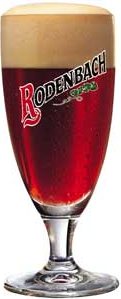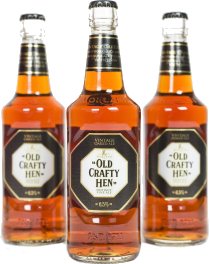 |

|
|

|
|
|
 |

home
about
features
A-Z
books

|

|

Protz:
features
reviews
tastings
|

| |
the Old Crafty Hen
by Willard Clarke, 09/08
'Ambassador of Beer' may be over-stating my role in life but I can lay claim to have built good relations between Rodenbach, the famous sour red brewery in Belgium, and Greene King in Suffolk.

|
|
Rodenbach in Roeselare and Greene King in Bury St Edmunds in Suffolk are geographically close - though there's a bit of water in between - and they are also linked by a rare style of beer.
On one visit to Rodenbach I took with me a couple of bottles of Greene King's Strong Suffolk Ale for a comparative tasting. The brewers were intrigued as they thought beer matured in wood that took on a sour and lactic character was a speciality confined to the West Flanders region.
Rodenbach matures its beer in 300 oak tuns for between 18 months and two years. The wood is unlined and the beer attracts the attention of micro-flora in the staves. The regular beer (5%) is a blend of young beer from metal tanks and the aged beer, but Rodenbach also produces Grand Cru (6.5%), which is uncut -- bottled straight from the wood. It has an oaky, tannic, sour and tart fruit aroma and palate with a stunningly dry and sour finish that has hints of quinine. The use of Vienna Red malt, similar to English crystal, gives the beer an enticing amber-red colour.
|
Across the sea in Bury, Greene King's Strong Suffolk is a blend of two beers. Old 5X (12%) is matured for between one and five years in giant wooden tuns stored in ancient tunnels that once linked the local monastery with the bishop's house that stood on the site of the brewery. The lids of the tuns are covered in sandy gravel, which the brewers think prevents wild yeasts and bacteria from infecting the beer. Nevertheless, Old 5X has a slight sour and lactic character with a hint of iodine. It's blended with a second beer, Best Pale Ale (5%), which makes up three-quarters of the beer bottled as Strong Suffolk. As a result of the blending, Strong Suffolk lacks the extreme sourness of Rodenbach Grand Cru, but it has a spicy, oaky, sherry-like aroma and flavour with a distinct lactic hint.
As a result of the tasting of Strong Suffolk at Rodenbach, the two breweries have established friendly links. Rodenbach is now owned by Palm, Belgium's biggest ale producer, a new brewhouse has been built at Roeselare and the vital oak tuns have been overhauled. Back home, Greene King has promoted Strong Suffolk with some zeal in recent years, including adding a new and more attractive bottle and label.
|
|

|

|
|
Now it has launched an intriguing bottled beer called Old Crafty Hen (6.5%). This is a blend of Old 5X and a stronger version of Old Speckled Hen. Rodenbach will be impressed, as the blend has a luscious amber-red colour similar to Grand Cru's.
Old Speckled Hen is famous for its rich, malt-accented aroma and flavour with a distinctive hint of butterscotch that comes from a natural compound called diactyl produced by yeast during fermentation. The blend contains between 10 and 15% Old 5X � it will vary slightly from batch to batch. In common with Rodenbach, the beer is not bottle conditioned, which is a pity. Is there, I wonder, a problem with blending two beers even when the same yeast strain is used? Perhaps a friendly brewer could explain.
|
As a result of the blending, Old Crafty Hen's aroma and palate have less of a pronounced butterscotch character. The rich malt is married with a spicy and peppery note with raisin and sultana fruit, vanilla and a hint of oak. There are strong hop resins notes in the mouth, balancing malt and fruit, while the finish is rich, smooth, fruity, malty but finally dry with a lingering spicy hop note.
Old Craft Hen is available in Tesco for �2.49 for a 500ml bottle. Other stockists may become available so consult the website www.greeneking.co.uk.
I trust a few bottles will make their way across the North Sea to Roeselare for the pleasure of the brewers at Rodenbach. In the 1990s there was a theory that when a member of the family, Eugene Rodenbach, went to study brewing techniques in England in the late 19th century he must have been inspired to produce a beer matured in oak as a result of a visit to Greene King.
There's nothing prove this and at the time many English country brewers matured their beers in wood and blended two or three beers: this was how the first porters were made. But whatever the inspiration, today Greene King and Rodenbach are members of a rare breed, preserving a great brewing tradition.
|
|
home
about
features
A-Z
books
|

